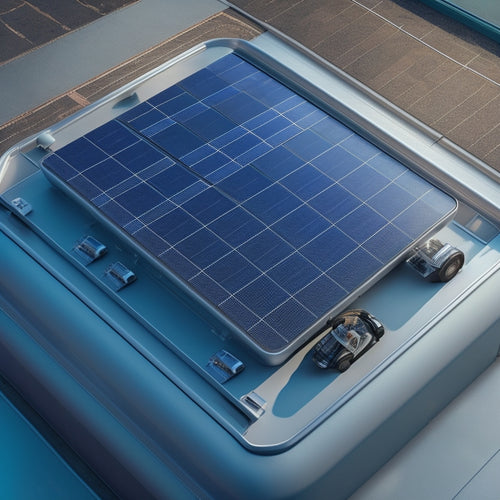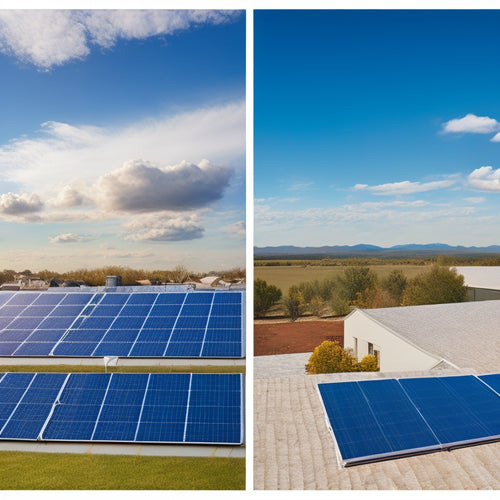
How to Lower the Average Cost of Home Battery Storage
Share
You can greatly lower the average cost of home battery storage by taking a strategic approach to system sizing, battery type selection, and procurement. To optimize your system's size, monitor your energy consumption patterns to determine the ideal battery capacity. Choose the right battery type based on your specific needs and budget constraints, considering factors like efficiency, lifespan, and maintenance costs. Shop for discounts and deals, and consider refurbished or used batteries to reduce costs. By making informed decisions, you can save thousands of dollars over the lifespan of your system, and exploring these factors further can lead to even more cost-effective solutions.
Key Takeaways
- Optimize battery system size based on daily energy consumption to reduce waste and expenses.
- Choose the right battery type, such as lithium-ion, to ensure higher efficiency and lower maintenance costs.
- Research and take advantage of seasonal sales, manufacturer promotions, and bundle deals to secure discounts.
- Consider refurbished or used batteries, which provide reliable performance and significant savings, while reducing environmental impact.
- Compare prices and negotiate with local installers to get the best deal, and stay informed about market trends and price fluctuations.
Understanding Current Market Prices
Current market prices for home battery storage systems vary widely, depending on the type and quality of the equipment, installation costs, and geographic location.
You'll notice that prices can fluctuate greatly based on market trends and the specific components chosen. For instance, a high-capacity lithium-ion battery system with advanced monitoring and control systems will typically cost more than a basic lead-acid battery system.
As you research different options, you'll want to take into account the total cost of ownership, including the upfront purchase price, installation costs, and ongoing maintenance expenses.
Keep in mind that prices can vary greatly depending on your location, with areas having high electricity rates or limited solar resources potentially requiring more expensive systems.
Staying informed about market trends and price fluctuations can help you make an informed decision when purchasing a home battery storage system.
Optimizing Battery System Size
As you steer through the intricate terrain of home battery storage systems, sizing your system correctly becomes a critical factor in achieving ideal performance and cost-effectiveness. A correctly sized system guarantees that your energy consumption is efficiently met, reducing waste and unnecessary expenses. To optimize your battery system size, you'll need to monitor your energy consumption patterns.
| Energy Consumption Pattern | Recommended Battery Capacity |
|---|---|
| Low (1-2 kWh/day) | 2-4 kWh |
| Medium (2-5 kWh/day) | 4-8 kWh |
| High (5-10 kWh/day) | 8-12 kWh |
| Very High (>10 kWh/day) | 12-16 kWh |
Choosing the Right Battery Type
Get down to business by selecting the right battery type, as it greatly impacts the overall performance and cost of your home battery storage system.
You'll need to weigh the pros and cons of each option. Lithium-ion batteries, for instance, offer several advantages, including higher efficiency ratings, longer lifespans, and lower maintenance costs.
They're also more compact and lighter, making them easier to install. On the other hand, lead acid batteries have some major drawbacks, such as lower efficiency, shorter lifespans, and higher maintenance costs.
They're also heavier and bulkier, requiring more space and labor for installation.
When choosing a battery type, consider your specific needs and priorities. If you want a high-performance system with minimal upkeep, lithium-ion might be the way to go.
However, if you're on a tighter budget and don't mind sacrificing some efficiency, lead acid could be a more affordable option.
Ultimately, selecting the right battery type will greatly impact your system's overall cost and performance.
Shopping for Discounts and Deals
Having selected the right battery type for your home storage system, you can now focus on finding the best deals to fit your budget.
Shopping for discounts and deals is an important step in reducing the overall cost of your home battery storage system. Start by researching seasonal sales and manufacturer promotions that can help you save money. Many manufacturers offer discounts during peak sales periods, such as summer or holidays, so it's vital to time your purchase strategically.
Additionally, look for bundle deals that include the battery, inverter, and installation, as these can often be cheaper than buying individual components. You can also check online marketplaces, such as Amazon or eBay, for discounts on certified refurbished or open-box batteries.
Be sure to compare prices from different retailers and consider negotiating with local installers to get the best deal. By taking advantage of these discounts and deals, you can greatly lower the average cost of your home battery storage system.
Considering Refurbished or Used Batteries
Nearly 80% of homeowners consider cost a significant factor when deciding on a home battery storage system. If you're looking to reduce your expenses, considering refurbished or used batteries might be a viable option.
Refurbished batteries, in particular, can offer significant savings while still providing a reliable performance. These batteries have undergone thorough inspections and repairs to guarantee they meet manufacturer standards, often with warranties to back them up.
When purchasing refurbished or used batteries, it's crucial to research the seller and the battery's history. Look for information on the battery's lifespan, charging cycles, and any previous issues. You'll also want to verify the battery is compatible with your existing system.
Considering refurbished or used batteries can also help reduce environmental impact. By reusing or repurposing existing batteries, you're reducing the demand for new, resource-intensive batteries.
Additionally, refurbished batteries can still provide several years of service, extending their lifespan and delaying their eventual disposal. Just be sure to weigh the potential cost savings against any potential risks or compromises on performance.
Frequently Asked Questions
Can I Install a Home Battery Storage System Myself?
You can attempt a DIY installation, but beware: home battery storage systems involve complex electrical and safety considerations, so it's essential you possess extensive technical knowledge and follow strict safety protocols to avoid risks and guarantee a successful installation.
How Long Does a Typical Home Battery Warranty Last?
As you traverse the uncharted territory of home battery storage, you'll find that typical warranties last around 10-15 years, but with diligent maintenance tips, you can extend its lifespan, making warranty comparison an essential step in your power-hungry expedition.
Will a Home Battery Storage System Increase My Property Value?
You'll likely see an increase in your property value with a home battery storage system, as a property appraisal will factor in the added value from the system, especially if there's high market demand for energy-efficient homes in your area.
Can I Use a Home Battery to Power My Electric Vehicle?
You can use a home battery to power your electric vehicle, but make certain the battery is compatible with your vehicle's charging system, and consider the vehicle's charging capacity to optimize efficient vehicle charging.
Are There Any Government Incentives for Home Battery Storage Systems?
You're on the right track, hitting the nail on the head by inquiring about government incentives for home battery storage systems. You can tap into tax credits, rebate programs, and financing options, which can help offset installation costs and release energy savings and environmental benefits.
Related Posts
-

Solar Panel System Certification Costs: A 10-Point Breakdown
You're looking to understand the costs associated with solar panel system certification. Your total certification cos...
-

Top Solar Panels for Car Battery Maintenance
When selecting top solar panels for car battery maintenance, consider high-efficiency models with high wattage output...
-

Tracking Solar Panels Vs Fixed Panels Cost Savings
When considering solar panel options, you'll want to weigh the cost savings of tracking solar panels versus fixed pan...


